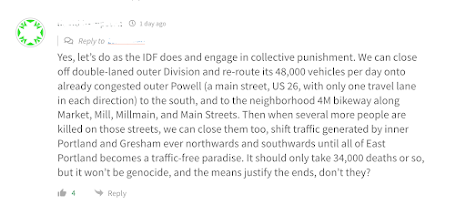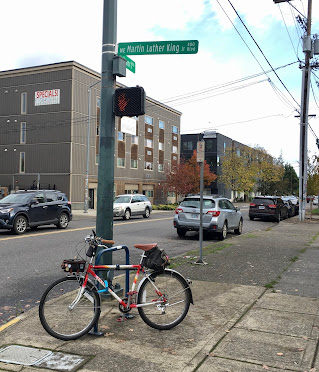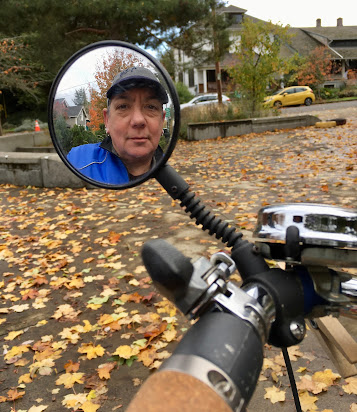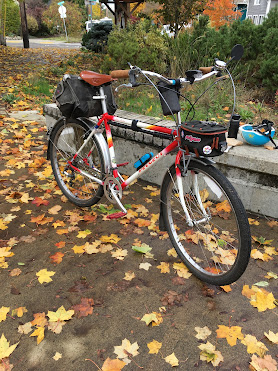Rivendell Bicycle Works was founded in 1994, by a guy with some very particular ideas about what a good bicycle ought to be. Over the years, his ideas expanded to bicycle accessories and then to riding.
RBW became a cool little mail order company and people caught on.
I was one of those people. I began working in the bicycle industry the same year that Rivendell began, and I was attracted to many of the ideas that RBW espoused.
Five years later, I bought a Rivendell frameset — well, actually a truck driver’s insurance company bought it for me — and built it up.
It has been a lovely ride, both the bike and the time spent living my bicycle life according to RBW’s template. I couldn’t keep up with all of it, mind you — I was never strong enough to be a long term mega-miler and my income simply couldn’t keep up with RBW’s prices — but I did my best to enjoy myself.
Then Covid happened, and it changed my life.
I couldn’t ride a bicycle at all for almost two years. When I could begin riding again, it was a lot slower, the distances were much shorter, my tolerance for cold, wet weather had greatly diminished and my balance was more precarious than before.
At the height of my bicycle life, I averaged over two thousand miles a year for close to a decade. I wasn’t breaking any speed records, but I got to ride through some lovely places and mostly enjoyed it.
Since coming out of the pandemic and resuming riding, my rides are fewer and shorter now. If I can manage a ride of four miles round trip that’s an incredibly good day, and leaves me exhausted afterwards. Sometimes I feel wobbly and have to stop riding and walk my bike for awhile. I no longer leave the house without my transit pass, in case I have to put my bike on the bus to get home.
(This happens more often than not these days.)
During the latter half of lockdown, when I was still able to turn wrenches, I found an old Peugeot mountain bike, and set about making it work for me. It sits slightly lower than my Rivvy because the frame is more vertically compact. This means I need a longer stem to make the handlebars the right height. It looks a little dorky but it’s safe and solid for the riding I do now.
It’s also got a lower top tube, so I can get on and off more easily.
And for reasons I’m still not entirely clear on, it’s more comfortable to ride than the Rivvy now. The laid-back geometry allows me to set the saddle farther back, putting my legs and knees in a comfortable place. The most telling difference is that after I ride the Rivvy, my knees hurt for days. After I ride the Peugeot, they feel fine. I need to hang out with this some more before I reach any conclusions about how and why.
Since I don’t ride as much as I used to, I‘m giving some thought to selling my 1999 All-Rounder, and being done with the whole RBW-cool of it all.
Early in RBW’s history, Grant would encourage folks to buy his bikes by saying they were “affordable for anyone with a job and bicycle priorities,” and I always winced a little when I read that. While I did buy a Rivendell myself, it was with the proceeds from a crash settlement. I certainly could never have afforded it myself, not on my bike mechanic’s wages. And I needed my bike shop job to obtain the discounted parts with which to build it up.
I worked in a bike shop that focused heavily on repairs, and on encouraging people to commute by bicycle on whatever they had. This probably helped to inform my discomfort as well.
It was fun for a long while, but I always held something back. Some of my enthusiasm was always tempered with how damned expensive it was to become part of the Rivendell cult, and also how overly male the whole thing felt for quite a long time. I’ve never forgotten that awareness in thirty years of my own enthusiasm for good bikes and places to ride them. That awareness has tempered my enthusiasm a little bit this whole time.
It’s not unlike the other parts of my life where I’ve belonged, but not fully. When the first half of your life is spent on the margins and always on the go, you never become fully grounded in any scene or group, because you can’t. It’s part of the hardwiring of my brain, for better or worse. Probably both. And it can’t really be undone now, and I am learning how to live with that knowledge. I am learning how to discern what still makes sense in my life, and what needs to be set down.
Not fully belonging has been hard but it has also allowed me to see things from a different angle. And so it has been with Rivendell and my participation in the RBW cult. I participated while knowing that I could never really keep up, and when I got dropped — physically, geographically or financially, I just kept riding my own ride and calling it good.
I’ve gotten to a point where I no longer have “bicycle priorities,” or the stamina to chase after them. And that realization has helped me to see where and how the RBW thing isn’t really serving me anymore. Not keeping up has become far more prevalent since I got sick and never fully recovered. Not keeping up has given me a new perspective on what it means to be in my body, and on how I move around in the world today.
I’m thinking about putting the Rivendell up for sale, probably in the early spring. I don’t know yet if I will sell it as a frameset or as a whole bike. I have a few months to consider that, and also to determine if I have enough strength in my hands to dismantle and clean it up.
I’m not sure yet what I’d ask for the bike, and will think about it over the winter. But I will not accept trades, in whole or in part. Meanwhile, I’m pondering.
























































